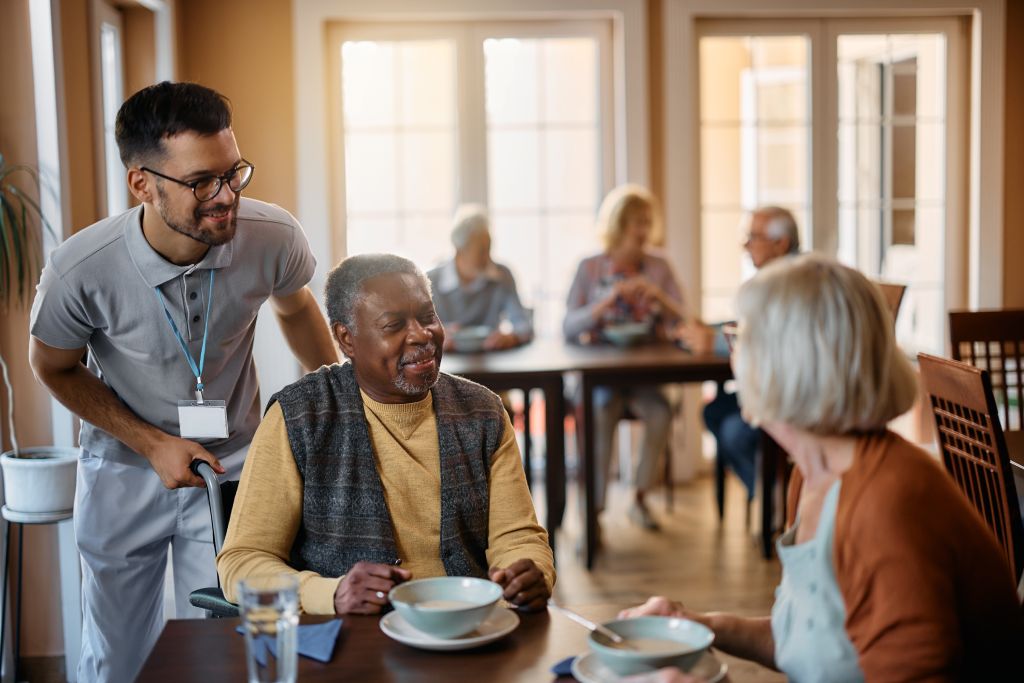Explore specialized Memory Care facilities designed for cognitive health.
Explore specialized Memory Care facilities designed for cognitive health.
Blog Article
Exactly How Aided Living Facilities Enhance Lifestyle for Those With Mental deterioration
Helped living facilities play a pivotal duty in improving the top quality of life for people with mental deterioration by implementing customized care methods that deal with their distinctive requirements. These environments integrate organized activities with emotional support, cultivating a sense of area while ensuring safety and security and independence. The combination of engaging programs and family members participation even more improves the residents' experience. The complexities of mental deterioration care proceed to evolve, prompting a better exam of exactly how these facilities adapt and introduce to satisfy the obstacles dealt with by residents and their family members. What implications does this have for future care designs?
Personalized Care Program
(Dementia Care Charlotte)In a lot of cases, people with dementia require tailored support that resolves their distinct requirements and choices. Customized treatment strategies are necessary in assisted living setups, as they make certain that each resident receives appropriate focus and services. These plans are established collaboratively, including health care experts, caregivers, and member of the family to develop a detailed summary of the person's case history, cognitive capacities, and personal interests.
A well-structured customized care plan normally includes specific objectives associated with wellness management, everyday activities, and social interaction. It represents the individual's cognitive decrease while advertising freedom and self-respect. Routine assessments and updates to the treatment plan are essential, as they enable adjustments based upon the citizen's evolving problem and choices.
Secret parts of these plans frequently involve drug administration, behavior assistance approaches, and dietary guidelines customized to the person's requirements (Assisted Living). By focusing on individualized treatment, helped living centers can promote a supportive setting that improves the lifestyle for people with dementia, ultimately adding to their general health and happiness. This individualized approach appreciates the individuality of each resident, guaranteeing they receive the compassionate care they require

Engaging Tasks and Programs
Engaging citizens in meaningful tasks and programs is critical for enhancing the quality of life for individuals with dementia. These tasks not just supply pleasure yet additionally promote cognitive function and advertise social interaction, which can mitigate sensations of seclusion usually experienced by citizens.

Additionally, tailored programs are important in making sure that each citizen's one-of-a-kind choices and capacities are recognized. This customized strategy urges participation, enhances self-confidence, and gives a feeling of success.
In addition, normal analyses of homeowners' rate of interests can help staff change and adapt activities to much better fit developing needs. By focusing on interesting tasks and programs, helped living facilities can substantially enhance the total experience and emotional health of individuals dealing with mental deterioration.
Safe and Helpful Setting
Developing a risk-free and supportive setting is crucial for individuals with mental deterioration, as it straight influences their well-being and lifestyle. Aided living centers are made with certain functions that promote safety and security while cultivating a complacency and comfort. These settings prioritize ease of access, with designs that minimize complication and motivate freedom, enabling homeowners to browse their surroundings more conveniently.
Security measures, such as secure entries and exits, protect against roaming and unauthorized accessibility, which are critical factors to consider for individuals with mental deterioration (Assisted Living). Personnel are educated to recognize the one-of-a-kind needs of homeowners, providing customized support and guidance to ensure their security. Furthermore, the incorporation of relaxing colors and acquainted things can help in reducing anxiousness and disorientation, developing an extra soothing ambience.
In addition to physical security, psychological support is vital. Facilities frequently utilize team that are not just competent in caregiving yet also learnt empathy and interaction, cultivating trust and connection with citizens. This alternative approach adds to a nurturing atmosphere where people feel valued and comprehended, eventually boosting their total quality of life.
Social Communication and Neighborhood
A helpful atmosphere not just focuses on safety and security however additionally fosters opportunities for social interaction and community involvement, which are important for individuals with dementia. In nursing home, structured activities and public spaces encourage residents to connect with each other, decreasing sensations of seclusion often experienced by those with cognitive disabilities.
Social communication plays a considerable role in improving psychological wellness and cognitive function (Assisted Living). Engaging with peers in group tasks such as games, arts and crafts, or exercise not only boosts cognitive capacities yet likewise nurtures a sense of belonging. Facilities usually arrange occasions that advertise socializing, enabling homeowners to construct relationships and share experiences, which can be specifically valuable for those with mental deterioration
Additionally, a lively community ambience can boost the general high quality of life for locals. Staff members are educated to help with communications and support homeowners in developing purposeful connections.
Family Members Involvement and Assistance
Household participation is important in sustaining individuals with dementia in assisted living environments. Proactively involving family participants not just offers emotional comfort to homeowners but likewise cultivates a sense of belonging and connection in their lives. When families take part in treatment planning and daily tasks, they add valuable insights concerning the person's choices, history, and needs, which can enhance tailored care.
Furthermore, normal family members check outs can dramatically enhance the psychological health of homeowners, decreasing sensations of isolation and stress and anxiety. Member of the family can additionally assist in keeping cognitive feature by engaging their enjoyed ones in acquainted conversations and activities. This interaction strengthens individual identification and aids residents really feel view publisher site valued and understood.

Verdict
In conclusion, aided living facilities dramatically improve the high quality of life for individuals with mental deterioration with individualized care strategies, engaging activities, and a safe atmosphere. Collectively, these factors produce an alternative approach to care that addresses the special needs of people with dementia, promoting overall well-being and dignity.
Report this page